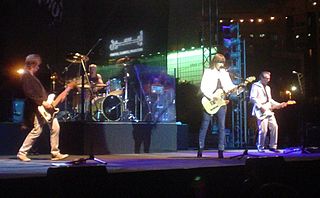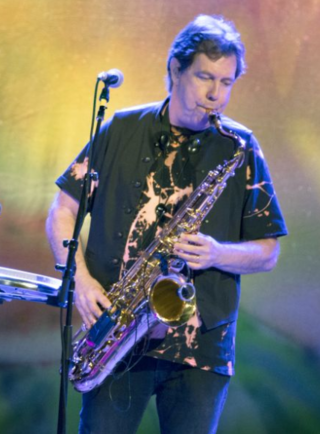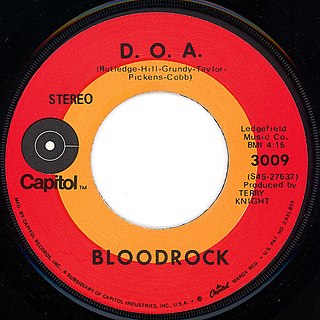
The Pretenders are a British-American rock band formed in March 1978. The original band consisted of founder and main songwriter Chrissie Hynde, James Honeyman-Scott, Pete Farndon and Martin Chambers. Following the deaths of Honeyman-Scott in 1982 and Farndon in 1983, the band experienced numerous personnel changes; Hynde has been the band's only consistent member.

Quicksilver Messenger Service is an American psychedelic rock band formed in 1965 in San Francisco. The band achieved wide popularity in the San Francisco Bay Area and, through their recordings, with psychedelic rock enthusiasts around the globe, and several of their albums ranked in the Top 30 of the Billboard Pop charts. They were part of the new wave of album-oriented bands, achieving renown and popularity despite a lack of success with their singles. Though not as commercially successful as contemporaries Jefferson Airplane and the Grateful Dead, Quicksilver was integral to the beginnings of their genre. With their jazz and classical influences and a strong folk background, the band attempted to create an individual, innovative sound. Music historian Colin Larkin wrote: "Of all the bands that came out of the San Francisco area during the late '60s, Quicksilver typified most of the style, attitude and sound of that era."

Bread was an American soft rock band from Los Angeles, California. They had 13 songs chart on the Billboard Hot 100 between 1970 and 1977.

The Four Seasons is an American vocal quartet formed in 1960 in Newark, New Jersey. Since 1970, they have also been known at times as Frankie Valli and the Four Seasons. The band evolved out of a previous band called The Four Lovers, with Frankie Valli as the lead singer, Bob Gaudio on keyboards and tenor vocals, Tommy DeVito on lead guitar and baritone vocals, and Nick Massi on bass guitar and bass vocals. On nearly all of their 1960s hits, they were credited as The 4 Seasons. The band had two distinct lineups that achieved widespread success: the original featuring Valli, Gaudio, DeVito, and Massi that recorded hits throughout the 1960s, and a 1970s quintet consisting of Valli, Lee Shapiro, Gerry Polci, Don Ciccone and John Paiva, with Gaudio and Long providing studio support.

Steppenwolf was a Canadian-American rock band that was prominent from 1968 to 1972. The group was formed in late 1967 in Los Angeles by lead singer John Kay, keyboardist Goldy McJohn, and drummer Jerry Edmonton, all formerly of the Canadian band the Sparrows. Guitarist Michael Monarch and bass guitarist Rushton Moreve were recruited via notices placed in Los Angeles-area record and musical instrument stores.

The Steve Miller Band is an American rock band formed in 1966 in San Francisco, California. The band is led by Steve Miller on guitar and lead vocals. The group had a string of mid- to late-1970s hit singles that are staples of classic rock, as well as several earlier psychedelic rock albums. Miller left his first band to move to San Francisco and form the Steve Miller Blues Band. Shortly after Harvey Kornspan negotiated the band's contract with Capitol Records in 1967, the band shortened its name to the Steve Miller Band. In February 1968, the band recorded its debut album, Children of the Future. It went on to produce the albums Sailor, Brave New World, Your Saving Grace, Number 5, The Joker, Fly Like an Eagle, Book of Dreams, among others. The band's Greatest Hits 1974–78, released in 1978, sold over 13 million copies. In 2016, Steve Miller was inducted as a solo artist in the Rock and Roll Hall of Fame.

Black Oak Arkansas is an American Southern rock band named after the band's hometown of Black Oak, Arkansas. The band reached the height of its fame in the 1970s, charting ten albums. Their style is punctuated by multiple guitar players and the raspy voice and on-stage antics of vocalist Jim "Dandy" Mangrum.

Blackfoot is an American Southern rock band from Jacksonville, Florida, formed in 1970. Though they primarily play with a Southern rock style, they are also known as a hard rock act. The band's classic lineup consisted of guitarist and vocalist Rickey Medlocke, guitarist Charlie Hargrett, bassist Greg T. Walker, and drummer Jackson Spires.
Terry Knight was an American rock and roll music producer, promoter, singer, songwriter and radio personality, who enjoyed some success in radio, modest success as a singer, but considerable success as the original manager-producer for Grand Funk Railroad and the producer for Bloodrock.

Warren Ham is an American musician. He is best known for playing with Kansas (1982), Toto and Ringo Starr.
Tucky Buzzard were a British hard rock band formed in 1969 by three former members of The End. The original lineup was Jimmy Henderson (vocals), Terry Taylor (guitar), David Brown (bass), Paul Francis (drums), and Nick Graham (keyboards). Halfway through recording their debut album, Francis departed from the band and was replaced by Chris Johnson, who recorded the remaining drum parts and was credited on the album sleeve. Tucky Buzzard produced a total of five albums between 1969 and 1973. The band's producer was Bill Wyman of the Rolling Stones.

Bloodrock is the debut from the Fort Worth, Texas, hard rock band Bloodrock, released on 16 March 1970 by label Capitol Records. The cover art was designed by producer Terry Knight. AllMusic described the album in terms of hard rock and early "proto-metal", akin to Deep Purple. The group's similarities to Grand Funk Railroad in overall sound and singing style led critics to understand Knight’s interest in the band. The album "remains a cult favorite among fans of hard rock."

Bloodrock 2 is the second album by the Texas rock band Bloodrock. It was released on Capitol Records in October 1970 and produced by Terry Knight. The album was certified Gold by the RIAA in 1990.

Bloodrock 3 is the third album by the Texan rock band Bloodrock, released on Capitol Records in 1971.

Bloodrock U.S.A. is the fourth album by the Texan rock band Bloodrock, released on Capitol Records in October 1971. The album was the first produced by the band alone without Terry Knight and the last studio album to feature original members Jim Rutledge (vocals) and Lee Pickens.

Bloodrock Live is a live double album by Bloodrock released on Capitol Records in May 1972.

Passage is the fifth studio album by the Texan rock band Bloodrock released on Capitol Records in November 1972. Warren Ham was added in place of departed original members Jim Rutledge and Lee Pickens. The group abruptly switched from their hard rock style to a more progressive rock style more in the form of Jethro Tull, etc.

Triptych is a two-disc compilation by Texan rock band Bloodrock released under One Way Records in 2000. The material on the first disc consists of the 1972 album, Passage, and the first half of the 1973 album Whirlwind Tongues. The second disc consists of the last half of Whirlwind Tongues and unfinished material of the would-be late 1974 album, which Capitol Records refused to release at the time due to Bloodrock's waning popularity.

"D.O.A." is a song by Texas hard rock band Bloodrock released by Capitol Records in early 1971.

John Nitzinger is an American blues rock guitarist, recording artist and songwriter from Fort Worth, Texas.




















